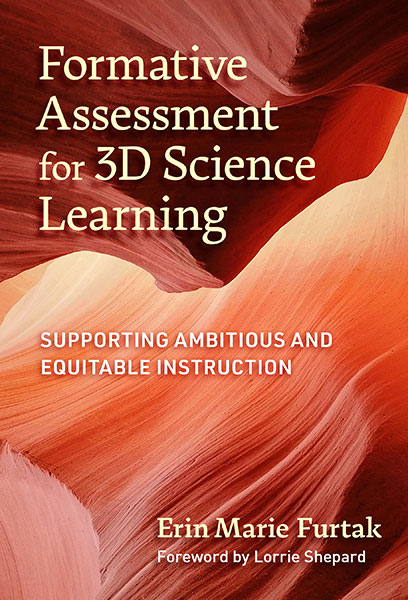Professors: Request an Exam Copy
Print copies available for US orders only. For orders outside the US, see our international distributors.
Foreword by: Lorrie A. Shepard
Publication Date: July 28, 2023
Pages: 256

The current wave of science education reforms emphasizes more equitable opportunities for students as they learn disciplinary core ideas and apply crosscutting concepts by engaging in the practices of scientists. Formative assessment—the assessment teachers and students conduct while learning is in progress—also needs to shift to support this vision. This book combines three-dimensional science learning, sociocultural theories of learning, and science for justice and equity to provide a comprehensive picture of formative assessment for today’s K–12 science classroom. Using practical examples and strategies, the author provides guidance for classroom teachers around formative assessment task design that centers students’ interests and builds on the resources they bring to school. The text explores the different enactment approaches teachers can use to prioritize and respond to students’ ideas as they are learning. It also offers approaches to, and resources for, professional learning that support teachers as they engage in formative assessment for ambitious science instruction.
Book Features:
Erin Marie Furtak is professor of STEM education at the School of Education, University of Colorado Boulder. Dr. Furtak received the 2011 Presidential Early Career Award for Scientists and Engineers (PECASE) and the German Chancellor Fellowship from the Alexander von Humboldt Foundation (2006).
“By writing Formative Assessment for 3D Science Learning: Supporting Ambitious and Equitable Instruction, Professor Furtak has provided a generous resource for science teachers and school leaders.… (She) lets us see how the theory works. What a wonderful and empowering professional gift.”
—From the Foreword by Lorrie A. Shepard, Distinguished Professor Emerita, University of Colorado Boulder
"For educators looking for a well-grounded approach to classroom assessments that promotes equity, this volume is a must-read. This book provides a new horizon for 21st-century classroom assessment along with concrete steps toward that goal."
—Hosun Kang, associate professor, science education and teacher education, University of California, Irvine
“As a teacher, researcher, and parent, Erin Furtak writes with equal parts knowing and caring about science teaching and learning. In Formative Assessment for 3D Science Learning, she provides educators with the vision and actions needed to help all students make progress toward science literacy in a rapidly changing world.”
—Richard Bacolor, science consultant, Wayne RESA, Wayne, Michigan
Contents
Foreword Lorrie A. Shepard xiii
Preface xv
My History in Science and Formative Assessment xvi
Why I Wrote This Book xvii
Scope xviii
To Whom This Book Is Directed xviii
Acknowledgments xxi
PART I: FRAMING
1. It’s Time to Rethink Formative Assessment in Science Education 3
What Is Formative Assessment in Science? 4
New Understandings About Learning That Influence Curriculum, Instruction, and Assessment 5
Formative Assessment for Ambitious and Equitable 3D Science Learning 11
Initial Drawings 15
Family Activity 15
How to Read This Book 16
2. Broadening Our View of Science Formative Assessment 19
Formative Assessment in a System of Classroom Activity 21
Defining Elements of a Formative Assessment Activity System 23
How Activity Systems Work to Support Learning Through Formative Assessment 33
Looking Ahead 38
3. Formative Assessment as a Vehicle for Equity and Justice in Science Learning 39
Structural Influences on Science Formative Assessment 40
Constraints on Formative Assessment 43
Formative Assessment as a Vehicle for Equity and Justice 45
Self-Reflection for Ambitious and Equitable Teaching 47
Centering Equity and Justice in Formative Assessment: Examples 49
Equity and Justice: Connective Threads for Formative Assessment Design and Enactment 53
PART II: TASKS AND PRACTICES
4. Questions Worth Answering: The Role of Phenomena in Formative Assessment 57
Considerations for Phenomena 58
Types of Phenomena for Formative Assessment 63
How Different Phenomena Support Formative Assessment Across an Instructional Unit 66
Resources for Identifying Phenomena for Formative Assessment 69
Putting It All Together: Framing Formative Assessment Tasks With Phenomena 69
5. Formative Assessment Tasks: Artifacts and Material Representations of Student Thinking 71
What Do We Mean by “Tasks”? 72
The Role of Formative Assessment Tasks 73
Integrating the Three Dimensions in Formative Assessment Tasks 75
Elements of Multicomponent Formative Assessment Task Design: Supporting Learners to Show What They Know 81
Putting It All Together: Redesigning a Multicomponent Formative Assessment Task 92
Beyond Paper and Pencil: Technology-Assisted Formative Assessment Tasks 100
Looking Ahead: The Importance of Practices and Feedback 103
6. Norms, Routines, and Community: Classroom Enactment of Formative Assessment 105
What Do We Mean by “Enactment”? 105
Participation Structures 106
Norms and Routines 111
Talk Moves: Essential Elements of Formative Assessment Classroom Practices 118
Putting It All Together: A Formative Assessment Conversation to Support the Development of Student Thinking 119
7. Feedback 125
Feedback to Support Science Learning 126
A Model of Feedback 127
Medium Cycles 138
PART III: BEYOND THE CLASSROOM
8. Tools and Routines for Professional Learning: Collaborative Formative Assessment Design 143
Teacher Professional Learning Through Formative Assessment Design 144
Steps for Collaborative Formative Assessment Design 145
Increasing Opportunities for Teachers to Learn Through Collaboration and Formative Assessment Co-Design 159
9. Learning Progressions: Tools for Formative Assessment 161
Defining Learning Progressions 161
Learning Progressions for Three-Dimensional Assessment 163
Three Functions for Learning Progressions in Formative Assessment 164
Features of Learning Progressions That Support Formative Assessment 174
Potential to Guide Formative Assessment, With Caution 176
10. Conclusion: Formative Assessment for Ambitious and Equitable Science Learning: Toward a New Horizon 177
Main Arguments 177
What Can We Do? 178
Closing 179
Appendix A. Phenomenon Planner 181
Appendix B. Heated Cup Task 183
Appendix C. Formative Assessment Task Design Checklist 185
Appendix D. Weather in Three Places Task 187
Appendix E. Snowmelt Task 189
Appendix F. High-Elevation Task 191
Appendix G. Enactment Planning Guide 197
Appendix H. Skateboarder Modeling Task 199
Appendix I. Sample Meeting Agendas for Collaborative Formative Assessment Design 201
Appendix J. Learning Progression Unit Planner 203
References 205
Index 221
About the Author 227
Professors: Request an Exam Copy
Print copies available for US orders only. For orders outside the US, see our international distributors.